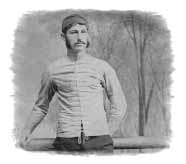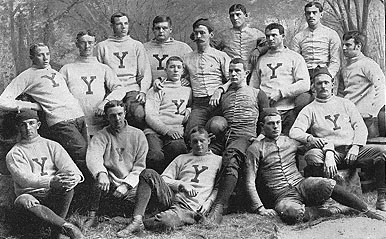"Walter Camp: The Father of Football"
by Dr Alan Ashworth
National Review, 14 October 1996
Copyright "1997 Yale Alumni Association of San Antonio"
Once again the football season opens. The smack of the practice punt
mingles with the smell of burning autumn leaves, and there is a chill in
the air. Football weather.
In 1869, Princeton played Rutgers in a game that claims to be the origin
of football - but what they played was really soccer. Harvard claims it
started football, but what it was playing was really English rugby.
No, football was devised by Walter Camp of Yale. Once, when Knute Rockne
was asked where his famous Notre Dame "shift" came from, he replied,
"Where everything else in football came from. Yale."

Camp entered Yale as a freshman in 1876, the son of a New Haven school
principal. Six feet tall and 157 pounds, he starred at tennis, crew, track,
swimming. He is even said to have invented the curve in baseball. But about
football he was obsessive. While still an undergraduate, he took part in
discussions with Harvard and a few other schools about how to organize
the game, and began to shape it.
At Camp’s urging, the number of players was held to eleven. He helped
formalize the seven-man line and the four-man backfield. He thought up
the center-snap to replace the chaotic rugby "scrum." He also
thought up the "downs" system (until 1882, a team retained possession
until it either scored, fumbled, or kicked the ball away to gain better
position).
Camp played seven years on the Yale team, including three while in medical
school, serving as captain and coach. He never became a physician. Instead,
he worked at the New Haven Clock Company and served as Yale’s unpaid coach.
When he had to be at the plant, his wife, Alice, daughter of Yale’s pioneering
sociologist William Graham Sumner, walked the practice sideline and took
notes for her husband.
Camp had towering Victorian integrity. In 1885, the Princeton team had
a game coming up against Yale in New Haven. They thought the previous year’s
referee, a Harvard man, was unacceptable, so he wasn’t invited back. Remarkably,
Yale’s Walter Camp was acceptable. He called the game with ruthless impartiality,
ruling against his own Yale team on two crucial plays as Princeton went
on to win 6 to 5 in the final minute. Camp’s philosophy was that of Theodore
Roosevelt’s, who once wrote: "In life, as in a football game, the
principle to follow is: Hit the line hard; don’t foul and don’t shirk,
but hit the line hard."
![]()

![]()
